Sleep! How precious, how precarious! Many of us struggle with insomnia.1 Perhaps we have apnea. Perhaps we own a cat who believes motionless humans are food. Perhaps we are simply aware that up to forty thousand redback spiders can fit into the volume of the average pillow. But sleep can be overdone. Imagine waking to discover that decades or centuries have passed…
This is a convenient way for an author to arrange for a protagonist not unlike the reader to tour an alien setting. Unsurprisingly, a lot of authors have taken advantage of the plot possibilities of the long sleep.
Consider these five classic science fiction examples.
Looking Backward: 2000-1887 by Edward Bellamy (1888)
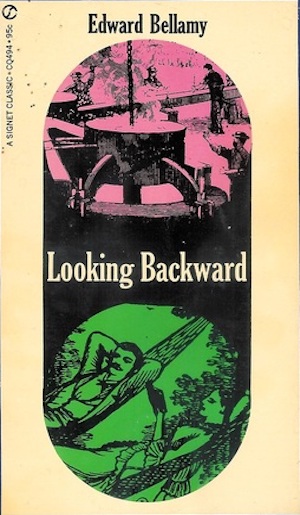
Julian West falls asleep in Gilded Age America. He does not wake until the year 2000. By this time, the United States has been comprehensively transformed almost beyond imagination. On his own, poor Julian would have been completely at sea in this brave new world. Providentially, his host Dr. Leete is more than happy to provide Julian with a guided tour of the America of 2000 AD.
And what a world it is! In the socialist utopia America has become, all industry is nationalized, each member of the industrial army is assured fair pay and retirement at age forty-five, and with economic injustice no longer fueling criminal behavior, crime is best handled with applied eugenics. It’s such an enthusiastic depiction of utopia as Bellamy imagined it, it seems churlish to note the almost complete absence of character or plot. Or non-WASPs.
***
Second Ending by James White (1962)
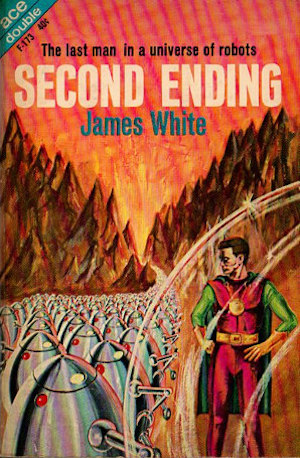
Medical student Ross submits to cold sleep in the hope that a cure will be found for his terminal illness. In the world after the First Atomic War, life is precious enough to warrant extreme measures to preserve it. When Ross finally wakes, he is healthy. He discovers that centuries have passed. Worse, the fact that people called the First Atomic War the First Atomic War was foreshadowing. The Emergency that broke out after Ross began his long slumber might have been called the Last Atomic War, if anyone survived to name it. Ross is the only living being left on Earth.
All is not lost, however. Ross has at his disposal an army of increasingly intelligent robots. In addition, his clothes were saved for him. There are a few tiny grass seeds in the turned-up cuffs of his trousers.2 Earth may be uninhabitable now, but it could be made to be habitable again. All that is required is vast amounts of labour and equally vast amounts of time. The robots will provide the first. Cold sleep will provide the second, in much greater quantities than Ross could imagine.
***
The Age of the Pussyfoot by Frederik Pohl (1969)
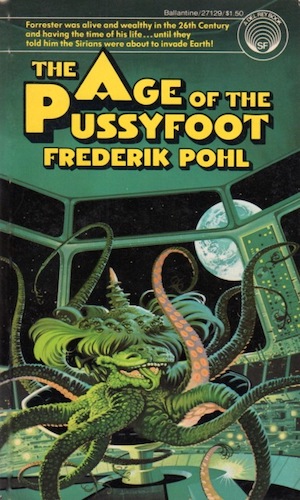
In 1968, volunteer fireman Charles Forrester bounds into a fire sans airpack and a little bit drunk. He immediately succumbs to smoke inhalation. Thanks to the miracle of cryopreservation, Forrester is revived in the year 2527. Alas, his loved ones are long dead, but he can take comfort from the knowledge that not only is 2527 a golden age of technological wonders3, Forrester is by the standards of 1968 a rich man, with no less than a quarter million dollars in his bank account.
Unfortunately for Forrester, tomorrow’s wonders are not provided gratis. In fact, by 1968 standards, they are expensive. Forrester could live off his quarter million indefinitely—if he was willing to live like a 1968-level peasant. If he wants to enjoy the full benefits of 2527, then Forrester will have to find some way to pay for that lifestyle with skills five centuries out of date.
And then there’s the matter of the Sirians, whose covetous ocular units have fallen on Earth….
***
Android at Arms by Andre Norton (1971)

Andas, Prince of Inyanga, wakes to discover that the lavish bed chamber in which he had fallen asleep has been replaced by a prison cell. Nor is he the only prisoner in the facility. The prison in which Andras wakes is fully stocked with kidnapped VIPs from a wide variety of worlds and time periods.
On the basis of surprisingly little evidence, the prisoners decide they must have been kidnapped so those dastardly Psychocrats could replace them with android doubles. It is just the sort of thing Psychocrats do! Great justice demands the prisoners break free, find their way home, expose the doubles and take back the power and positions that are theirs by birthright.
If only they had a better idea how long they’ve slumbered. Or if they were in fact the originals they believe themselves to be.
***
The Birthgrave by Tanith Lee (1975)
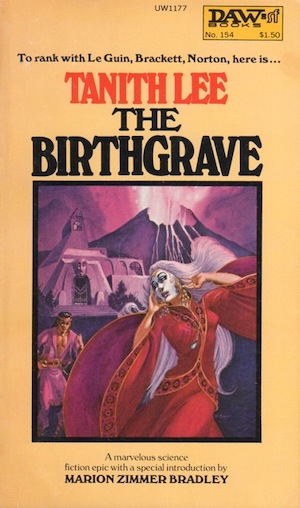
Centuries after the fall of her great and terrible people, an amnesiac wakes deep underground. A bodiless voice—Karrakaz—does its best to drive the amnesiac to suicide. Instead, she flees the cavern, to a surface now overrun by once humble humans and their barbarous cultures.
The humans have little in the way of history. What myths they share between them are interpreted in different ways. What they do agree on is that the amnesiac’s gifts—a prodigious healing factor, a visage that must be concealed lest it strike men speechless—mark her as Other, perhaps even a god. This makes the amnesiac precious. As the amnesiac will discover, there is a huge gap between valuable and powerful.
***
Of course, there are many more recent examples I could have mentioned but I seem to have run out of space. Perhaps there will be another essay! In any case, feel free to berate me for ignoring fantasy, while not mentioning classic works like The Sleeper Awakes, The Man Who Awoke, The Jameson Satellite, The Godwhale, and so many others in comments below.
Originally published March 2021.
In the words of Wikipedia editor TexasAndroid, prolific book reviewer and perennial Darwin Award nominee James Davis Nicoll is of “questionable notability.” His work has appeared in Publishers Weekly and Romantic Times as well as on his own websites, James Nicoll Reviews and Young People Read Old SFF(where he is assisted by editor Karen Lofstrom and web person Adrienne L. Travis). He is a four-time finalist for the Best Fan Writer Hugo Award and is surprisingly flammable.
[1]See Lawrence Block’s Evan Tanner: his brain-damage-induced incurable insomnia and his equally incurable love of lost causes were turned into an eight-book series.
[2]Imagine if the fashion of the day mandated properly tailored trousers!
[3]Including a device called a joymaker: “The remote-access computer transponder called the ‘joymaker’ is your most valuable single possession in your new life. If you can imagine a combination of telephone, credit card, alarm clock, pocket bar, reference library, and full-time secretary, you will have sketched some of the functions provided by your joymaker.” Joymakers are a perfectly reasonable guess at what a smartphone might look like. While Pohl set his novel centuries hence, he didn’t think his technological marvels would take that long to appear: “I don’t really think it will be that long. Not five centuries. Perhaps not even five decades.” It was more like forty years.










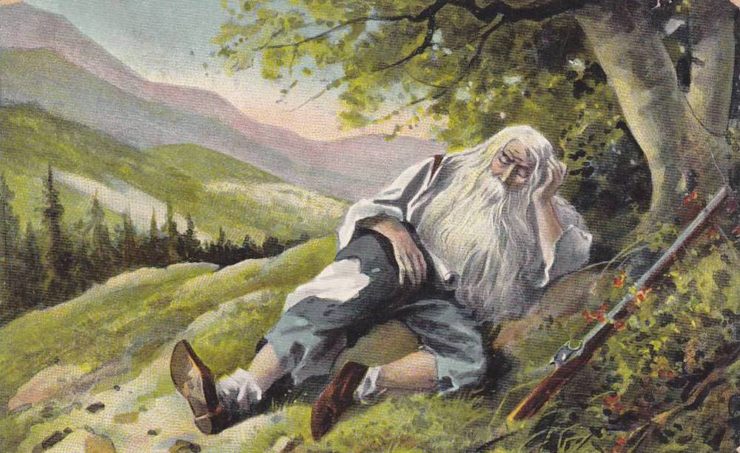
No Buck Rogers?
No Red Dwarf?
No Demolition Man?
No Idiocracy?
<sigh>
“The Marching Morons”(1951) by C.M. Kornbluth. A crooked real-estate broker from the late 20th century, accidentally placed in suspended animation, is awakened in the distant future to find Earth overpopulated by “morons” with about a million “smart” people secretly running things to keep them from wrecking the world. He educates them in marketing-hype-based genocide, which they cheerfully adopt, as a means of reducing the low-IQ population. Then and now, a highly controversial satire of what happens when hard-sell hucksterism is combined with eugenics.
I don’t know if it’s considered a classic, but there’s also “The Rip Van Winkle Caper” from the original Twilight Zone.
Arthur C. Clarke, “Nemesis”. The Master’s dreams of world conquest are crumbling to dust. He informs his staff about his plan to go into suspended animation & conquer the world a century hence … but he’s not including them, he notes, as he leaves & seals them into an airtight underground bunker.
Unfortunately for his plans, the wake-up mechanism is badly designed. Hijinks ensue.
There was a pair of Cordwainer Smith stories about two sent by their father in a suspended animation rocket, to be awakened on a future Earth. As I recall, the drawback is that the two are written as female-shaped plot tokens. But some glimpses of the future Earth are appropriately Cordwainer Smithian.
Larry Niven’s A World Out of Time, in which the main character from ~20th century is frozen and awoken (not revived, awoken) some centuries hence in an overpopulated one-world state. He is given only a cursory introduction to how things have changed, as the purpose for bringing him back was to throw him into an interstellar ramjet ship to scout out solar systems for colonization and seed likely planets for future use. There was handwaving as to why they needed an old-timer to do this. He gets cold-slept again, and comes back tens of thousands of years later, to find that things are really different now.
“Perhaps we are simply aware that up to forty thousand redback spiders can fit into the volume of the average pillow.”
Look please don’t tell me about things like that, eh?
Vernor Vinge’s Peace War and its sequels come to mind. He does a great job taking the idea of stasis fields, and extrapolating what the technology might lead to.
Mark Twain’s A Connecticut Yankee in King Arthur’s Court, has the sleep sending our narrator both back and forward in time. Of course the first sleep was crowbar-induced…
Does the Last Legends of Earth count if the people waking up with full memories have been regenerated from DNA fragments billions of years after the sun explodes?
Good call on Marching Morons- problematic as it is
Speaking of problematic- Allen’s Sleeper.
Second Ending was nominated for a Hugo. The Birth grave for a Nebula.
I was particularly impressed with Pohl’s joymaker after he explained in an afterword that he was extrapolating directly from 1960s computer networks. Not many people were able to predict the shape of the oak so accurately by looking at the acorn.
***
M.I.T.’s Project MAC was what made me think of the joymaker—well, that’s not quite true; I had thought of it before Project MAC ever existed, but certainly MAC is a son [sic- maybe “sort”?] of Jurassic ancestor of my toy. At M.I.T., two big IBM 7094s, plus half a dozen or so servant computers, are available to anyone with a remote-access console in his home or office. The console right now can be anywhere a telephone line will go—including Europe, if you like, or for that matter Antarctica. My only additional assumption is that it will be convenient to do the same thing by radio. The MAC consoles are presently about the size of biggish electrictypewriters; my only change involves microminiaturizing them into portability—and, while you’re at it, fitting them with a few of such necessities of modern urban life as Miltown, contraceptive pills, aspirin, and the like. I also assume that the pharmacopeia of the next few centuries will be more extensive than our own, but that seems like a reasonably good bet.
***
Granted, my iPhone still can’t dispense tranquilizers or mix a decent Manhattan.
Woody Allen film – Sleeper
The Death of Sleep is an SF novel by Anne McCaffrey and Jody Lynn Nye. Its main character is a doctor who signs on for a short tour aboard a space liner, leaving her daughter behind. The ship meets with a catastrophe and she is placed in “cold sleep” (cryogenic.) She wakes up and 43 years have gone by. And that’s just the first one…
This is a prequel to Anne McCaffrey’s book Dinosaur Planet, and there are several other books in the series, two of them coauthored by Elizabeth Moon. Cold sleep is a plot factor in just about all of them at some point.
I read Looking Backward for a university class on science fiction, and leaving aside how it was frankly dull and also VERY obviously written by a white 19th century dude, it did kinda depress me that the twenty first century had failed so badly in so many ways to live up to expectations of a man a hundred years in the past. Not in the Where Is My Jetpack way, that you can laugh off as the people of the past having completely a unrealistic understanding of what is actually technically possible. But equal pay for men and women? That is NOT technically impossible! That shouldn’t even be hard! And we still haven’t got it! And this guy was arguing for it in EIGHTEEN FREAKING EIGHTY EIGHT! I felt, reading that book, like the author would be absolutely crushed to see what the year 2000 was actually like, and that made me sad.
Weirdly, the only area in which we managed to meet and surpass Bellamy’s hopes for the future was in access to music. An important part of Utopia for him was the idea of everyone being able to access the best music equally, when in his time it was limited either by who had the equipment and the musical skill to play an instrument themselves, or had the money and geographical proximity to get tickets to a concert hall. So Bellamy’s idea was a literal series of tubes connecting twenty four hour concert halls to every home in America so that at any time you could open the correct tube and listen to live music. Making music a kind of utility like water, I guess. Bellamy apparently couldn’t conceive of the idea of recorded music on demand, radio, streaming, physical and digital music collections. So I tried to console myself a little with the idea that at least he would think that MP3s were cool.
@5 Those two Cordwainer Smith stories are “Mark Elf” and “Queen of the Afternoon.” The two girls’ father was a Nazi rocket scientist who launched them into orbit in 1945 as the war ended.
Heinlein’s “The Door into Summer” was my introduction to this trope and it still stands as an excellent example.
a few of such necessities of modern urban life as Miltown,
– Okay, that explains the ‘joymaker’ name. Clearly, he extrapolated spam calls, and annoying FB posts as well.
I may need to read the Pohl based on the cover alone!
In Heinlein’s Methusalah’s Children, the escaping Howard families resort to cold sleep when space travel becomes too boring.
Fry in Futurama. Also, I guess the Empress Jadis of Charn.
Sleeping Beauty is probably the oldest example, but I like how Rip Van Winkle plays against this particular trope in that the (relatively) short duration of Van Winkle’s sleep is the whole point – ie, a lot can happen in twenty years.
Another interesting entry in this subgenre – Philip Jose Farmer’s “The Stone God Awakens”. A man is accidentally hit by a ray that immobilizes his atomic structure, turning him into ‘stone’ and rendered essentially indestructible. Eventually it wears off, but by then an enormous amount of time has passed (it’s hinted that it might even have gone through a full universal cycle of destruction and Big-Bang rebirth).
T.J. Bass, Half Past Human
And again with the Early Riser by Jasper Fforde. Hibernation, doncha know.
And, come to think of it, Moominland Midwinter, which is another hibernation book.
There are some pretty sleepy people in James White’s The Dream Millennium.
The “ice assassins” use suspended animation as a tool of politics in Bruce Sterling’s Schismatrix – they don’t do anything as gauche as killing their political opponents, they just put them in cryosleep for a few decades so that their opinions and their political knowlege get to be way out of date.
Brian Stableford’s “Emortality” series, in its final volume (The Omega Expedition), involves a guy called Adam Zimmerman who’s effectively the off-screen protagonist for the series as a whole – he sets off the quest for immortality and goes into suspended animation before the story even starts, then is thawed out for the grand finale and gets to see the radical social changes he’s caused. It struck me as an intriguing conclusion to an interesting set of books.
@12
“Son” is a *very* common OCR error for “sort”. (My wife calls theae “scannos”.)
Your iphone may not dispense physical drugs, but phone games are so popular because they are efficient ways to trick your brain into producing dopamine.
For a more recent example, I could point out the Bobiverse series.
Got to do a shout out the Lawrence Manning’s – The Man Who Awoke.
The protagonist invents (I think) a way to sleep though time and the book is his story about what he finds each time he wakes. Based on a 1933 story it stands up very well – or at least from what I remember. Must re-read it sometime
“One Day at a Time” by R. A. Lafferty
James, would you be willing to do an exuberant prose collection? I realize it would include people you’ve already mentioned.
_The Unincorporated Man_– a very wealthy man is awakened into a world where everyone is a corporation and no one except him owns all of their own shares. More exactly, he isn’t a corporation at all.
I’m not sure the book is entirely sensible, but it’s good about how hard big political changes are, it has some surprises, and it is blessedly not a pastiche.
There are a bunch by Zelazny. _Lord of Light_ and “The Graveyard Heart” at least.
_Marooned in Real Time_ by Vernor Vinge. I’m assuming that any sort of suspension counts, it doesn’t have to be sleep or freezing.
What about Khan and his crew in the TOS episode Space Seed?
Besttopic ever :D

@6 I totally forgot about A World Out of Time. I think I read it when I was like 10 from the library. Even then it seemed sort of contrived. ‘Welcome back, now here is you spaceship, GTFO and come back in 10000 years.’
There’s Gene Roddenberry’s failed pilot, Genesis II, in which Dylan Hunt goes into suspended animation for a couple of centuries and misses out on WWIII and the world-wide implementation of Elon Musk’s underground tube transport system, which allows Hunt and the other main characters, who are members of a post-apocalyptic Peace Corps called ‘PAX’, to travel to different places on the ravaged Earth — so, planet-bound Star Trek.
He tried it again with Planet Earth, replacing Alex Cord with the inimitable John Saxon, in which PAX encounters a society run by (gasp) women, with the usual 1970s-era results.
I remember Genesis II being kind of fun (of course, I was 12), and mostly that it included Mariette Hartley and Ted Cassidy as main characters, as well as Majel Barrett, all veterans of Star Trek. Also that a nuke goes off at the end. And the transport tubes.
Becky Chambers “To Be Taught, if Fortunate” has her space explorer characters using cold sleep to get from star to star. An added advantage is their bodies are redesigned while sleeping to fit their next exploration.
I thought for a while I might be the only person who read, or remembered, Pohl’s Age of the Pussyfoot. What struck me about it was the way the protagonist made a living for a brief time with a sort of combination of YouTube and Patreon; he would present a story, and people would pay for it. I won’t explain what happens, for fear of spoilers; suffice to say it doesn’t last.
Good read, though.
Added on edit: I just remembered Keith Laumer’s Night of the Trolls. That was an excellent story, and I recommend it with enthusiasm to those interested in this class. Experimentation on a fancy method of induced human hibernation leads the viewpoint character to get into a sleep chamber. When he wakes up, expecting a couple of weeks to have passed, he discovers it’s been 80 years, and things have gone terribly wrong.
@33 Not the only one, I even thought of mentioning it before I scrolled down and saw that James had already done so.
Fun fact: some (or all) of the psychological quiz questions are real. In particular, the question that I’m not going to quote because it’s scatological was part of a real psych test (which I found out because around ’91 or so there were complaints, and it got some publicity).
Im surprised no one mentioned Tomorrow and Tomorrow by Charles Sheffield. A really well written book about cryosleep and how unrecognizable things would probably become as the MC continues travelling all the way to the end of the universe.
The Worthing Saga
Red Dwarf!
They’re all dead, Dave.
Philip K Dick’s late story “I Hope I Shall Arrive Soon”. Only as the title suggests, the Nap isn’t quite Extremely Long enough.
Another early one is George Allan England’s 1912 novel Darkness and Dawn, in which the two protagonists (man and woman) are somehow suddenly put to sleep for around 1,000 years. When they awake they learn that a meteor had destroyed civilization.